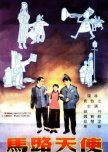
Esta resenha pode conter spoilers
"Who doesn't treasure life?"
Street Angel followed a group of low-income workers who forged bonds of love and friendship as they dealt with the hardships thrust upon them in an uncaring city of have and have-nots. Music, magic tricks, humor, and true love lightened the mood of a melodramatic story.Xiao Hong and her sister Xiao Yun fled the Japanese and ended up in Shanghai working in a tea house. Xiao Hong sings for the customers while the owner put her older sister to work as a prostitute. Hong flirts with the trumpet player, Xiao Chen, who lives across the street with his friends. Their flirtation turns to love and all seems well until Hong discovers her new guardians intend to sell her to a wealthy street gangster. Chen and his friend Wang, visit a lawyer with an office high in a skyscraper only to discover that justice is out reach for the poor. C buddies The buddies spirit Hong away and the two lovers marry. Yun finds her sister and for a time it looks like the sisters may have a happy life. Sadly, the melodramatic aspect of this film could not be outrun as the economy worsens and rent prices increase, even worse, the tea house owner and the gangster are hot on their trail.
Music dominated much of the film. Zhou Xuan sang several lovely songs and enthusiastic trumpet music also livened the story's setting. Chen entertained Hong and his friends with numerous magic tricks to keep everyone's spirits up when money was tight. Zhou Xuan and Zhao Dan played their roles exuberantly and earnestly as the lovers went from frolicking to despair.
The quality of the filming was difficult to tell as the film I watched in the public domain had not been restored and could be quite blurry at times. Even at that, I could tell it was well framed and shot. This was one of the earliest Chinese films to use sound and they made the most of it with the background music and musical numbers.
Street Angel worked in humor that bordered on slapstick without going overboard. The love story felt authentic, even the second love story felt earned. The bright loving, parade-like atmosphere crashed into reality by the end of the film when the characters faced the harsh truth of their lives and limits of their power. Those who lived high above them had access to justice and medical care while they struggled to keep a roof over their heads and a smile on their faces. "Who doesn't treasure life?" Treasure life they might, but the poor toiled in a system that would swallow them whole if they weren't lucky. This plucky group of friends were a delight to watch as they held each other up and held on tight, even when it seemed their luck had ran out.
8/29/23
Esta resenha foi útil para você?
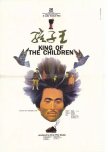
Esta resenha pode conter spoilers
"Without a dictionary, how will you be the king of children?'
King of the Children was a heartwarming slice of life film set in rural China during the Cultural Revolution. The story rolled along languidly with gentle humor as Lao Gan learned he had been assigned to be a teacher to a small poverty-stricken middle school. Without preaching, the film addressed some of the problems the school and children faced during the chaotic political time.Lao Gan who had not trained to be a teacher found out one day that he would take over a middle school class in a rural district. The children's poverty largely reflected his own. He was flummoxed that he had the only government approved manual and the children had no books. The principal had stacks of old teaching material in his building saying they were best used as toilet paper at the present time. The students had learned in the past by the teacher writing from the manual on the roughly hewn board in chalk. Poor Lao Gan was covered in chalk dust by the end of the day using this method. He also discovered that most of the children failed to recognize Chinese characters that they should have learned in elementary school. Top student Wang Fu called Lao Gan out saying he had no idea what he was doing but the effervescent teacher was quick to learn on the job. Realizing he needed to find a way to engage the children better, Lao stopped using the manual and started using personal essays to teach the children how to better comprehend the words they were learning in class. The teacher in the next hut complained that the students must not be learning because they laughed too much. It wasn't long before the principal knew he was not sticking to the manual, a problem regardless of the positive results. The Cultural Revolution was not open to a teacher who rocked the boat so Lao Gan's teaching career was short lived.
Xie Yuan was the heart and soul of this film with his genuine smile and wild, unruly hair. Lao Gan courageously and joyfully broke the rules in his attempt to open the children's minds to better understanding of what they were learning. Rote memorization and the copying of texts had not yielded successful results. By making the lessons personal, the students began to grasp the meanings and importance of the words and characters they were studying. But as many authoritarian leaders know, words and books have power which is why they try to control them.
The cinematography and scenery were gorgeous. Though the subject matter was realistic, the color filters were not, lending an almost fairytale ambiance to the poverty-stricken community and the special teacher who brought learning magic to the children. Red, blue and yellow filters, along with dense fog often conveyed mood better than words.
The film didn't directly confront the Down to the Countryside Movement. The children never spoke of being transferred from urban areas to the countryside to learn farming and animal husbandry instead of taking paths to higher education. Burned out tree stumps and a cleansing fire at the end of the film might have alluded to the 17 million youth of the Lost Generation. The words from the song in the background did give voice to it---
"I came from the eastern mountains
They don't let me go back
I came from the East
I want to go back."
I was a little surprised this movie was allowed to be made with its not-so-subtle criticism of the Cultural Revolution and perspective on poverty, but I'm glad it was. Lao Gan with his compassionate heart and riotous hair brought joy to the students and to this viewer. If you enjoy gentle slice of life stories about teachers attempting to break the education mold for the benefit of children, this might be one to try.
8/22/23
Esta resenha foi útil para você?

Esta resenha pode conter spoilers
"We know it's wrong, but preaching won't help"
Women of the Night was a brutal look at women without a support system who were left to fend for themselves on the streets during post WWII Japan. Sisters Fusako and Natsuko took different roads, but both ended up at the same destination—prostituting themselves to survive. Once again, Mizoguchi showed the devastating affects of war and poverty on women, this time taking on topics that were often taboo.Mizoguchi spared no one in this melodramatic look at the plight of women in the chaotic years after the war. A husband died, two children died, parents died, dying of malnutrition was a real fear, two sisters slept with the same man, opium was on the scene, STDs were dealt with, two characters were raped, gangs preyed on the weak, abortion was discussed, and pregnancy affected a main character. While life on the streets could be rough and deadly, Mizoguchi veered from informative into an area that felt exploitive.
Aside from desperation, the film was filled with anger, deep seething anger. Rage-filled Fusako hoped to infect as many men as she could. Natsuko only saw men as a way to make money, even willing to betray her sister to find a patron. The prostitution gangs fiercely guarded their territory, viciously attacking any woman who wandered their way or sought to turn straight. Men patrolled the streets looking for easy marks to rob and rape, further exasperating the predicament of young women on their own. Once "defiled" the girls often felt they had nowhere to turn but to prostitution.
Fusako had resisted turning to prostitution until the betrayal, which felt like an insincere reason for abandoning hope, and immediately diving into the world of street walking. By the end of the film, she made a 180 in the shadow of the Madonna in a bombed-out church that looked like a cemetery. It brought to mind the old Madonna (virgin) or whore definitions for women. She decided that she would work on behalf of all women for a world where their virtue could be protected. After being shown the dire straits women without family or fortune faced it felt insincere and an excuse for a hopeful ending. When the Purity Association had preached chastity at a women's clinic, the prostitutes jeered that they weren't turning tricks for fun and who would feed them if they quit? Would jobs suddenly be available and polite society accept them? Would men no longer take advantage of them? At one point there were 70,000 officially recognized prostitutes, not counting those who worked the streets. Mizoguchi repeatedly heaped humiliating trials and tribulations upon the female characters in this film and seemed to leave them with the false hope that simply walking away would provide them with food and shelter and a society that might come to accept them and be a safe place for women. After all the fury, degradation, and sorrow, the film's ending felt trite and unearned.
8/21/23
Esta resenha foi útil para você?
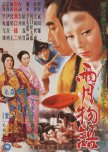
Esta resenha pode conter spoilers
"Success always comes with a price in suffering"
In Uegetsu, Mizoguchi wove a strange tale of hubris out of fantasy and realism loosely based on Ueda Akinari's stories. The acting and story telling were well done as Mizoguchi explored militarism and the price women paid for it. At least I hope that was the message.Spoilers Below:
The story opens with two couples-Genjuro and Miyagi and Tobei and Ohama. Genjuro decides to take his pottery to a larger town to sell with war on their doorstep, hoping to make a tidy profit. Tobei has dreams of grandeur as a samurai even though he doesn’t have enough money for a weapon or armor and heads to town with Genjuro. After Genjuro succeeds, he decides to make more pottery for a grander profit against Miyagi's advice. She wants them to be together happily and with soldiers headed their way they need to be prepared to flee. Genjuro ignores her and with Tobei, who was rejected by the samurais, works feverishly to fill his kiln. The soldiers arrive pillaging and enslaving, but the four manage to escape. Afterwards they rescue the pottery and take it to sell. Tobei uses his share to outfit himself and join the army. Genjuro is seduced by Lady Wakasa who says she will help him to make more money if he will marry her. He falls under her spell and forgets all about his wife and son. Ohama is captured by soldiers on the way home and gang raped. Miyagi is killed by ravaging soldiers for the meager amount of food she is carrying for her son. The husbands go about their lives enthralled with their circumstances, scarcely giving a thought to their wives caught up in the chaos of war.
Despite the negative ramifications shown of militarism and the effects it had on women, throughout the film I found the husbands reprehensible. Driven by ambition, lust, or a need for power, they hardly suffered. Yes, there was humor interspersed but the wives were not given the chance to laugh. After finally coming to their senses, Genjuro and Tobei both learned that home is where peace lies, coming full circle from the start.
Ohama's story was resolved too neatly for a woman who had been repeatedly "dishonored," not suffering the fate of so many comfort women from the previous war. I've read that Mizoguchi wanted a different ending, more in line with real life where she would have been shunned and Tobei would have stepped over her to grow his military power. Even with this "happy ending", had she been a real woman and not a man's version of a woman, she most likely would have suffered greatly from her painful and humiliating experiences and not immediately bounced back.
Death could not dim Miyagi's loyalty to her family. She who had been utterly abandoned by her husband continued to be caring toward him, looking out for him and her child by reuniting them. Miyagi who was forever separated from her child and husband due to his ambitious and lustful needs was never allowed to share the peaceful home fires she so lovingly stoked. Finally, Lady Wakasa could not be seen as a villain. She had been murdered along with her family by men bent on more power, and was only seeking the love she never lived to have.
The fantasy elements were well done and the film was well crafted. All of the performers conveyed their characters perfectly. The various soldiers and armies were routinely shown as out of control and often dishonorable---a scathing rebuke of militarism. This is one of those films that is considered a classic and one of Mizoguchi's best. While skillfully woven together, I could not get past the price of the husbands' hubris being paid by the women and why the dutiful wives were the ones who were destined to suffer for the men's misdeeds. How long Genjuro might have been haunted remained to be seen.
So even though the story taught a lesson to the husbands about ambition, and ultimately brought about the fulfillment of peace and harmony for those who remained, it came at a cost, a cost the women paid with their blood. Their selfish husbands finally did what was right for those who survived, but only after blowing everything up to begin with. Whether or not this was what Mizoguchi envisioned, as a woman it was a bitter pill to swallow.
8/15/23
Esta resenha foi útil para você?

Pending Train: 8:23, Ashita Kimi to
4 pessoas acharam esta resenha útil
Esta resenha pode conter spoilers
"If we can't live together, we'll die alone!"
Pending Train was an entertaining story about strangers on a train mysteriously landing in a dystopian future. The strength of the drama was the characters and how they learned to work together through their fears and problems in order to survive.Mild spoilers:
From the first, "Guys, where are we?" it began to feel like the writers had recently watched Lost (2004) and wanted to update the story for Japan. Shirahama Yuto (Jack) was a fire fighter with a painful past experience at work that has left him with deep seated guilt and a need to save everyone. Kayashima Naoya (Sawyer) was a hair stylist who due to his painful past trusted no one. Hatano Sae (too bland to be any character from Lost) was a school gym teacher who thought no one liked or respected her at work who was part of a weak sauce love triangle. The rest of the main cast contained a businessman who took a walk on the wild side (Locke), an effervescent game designer (Hurley), a graduate biology student who had a physics professor for some reason, a shady self-centered manicurist, and a middle-aged CEO who worried that she didn't spend enough time with her daughter.
As with Lost it turned out there were Others on the island who would compete for resources and survival. The battles were not nearly as deadly or mysterious. I have to say there were several characters who had me wishing a Smoke Monster would come and drag them away. At one point I honestly thought earnest Shirahama was going to quote Jack and say, "If we can't live together, we'll die alone," and he did more or less. Hatano was so uninspiring that her flashback story centered on her looking at a rainbow. She was everyone's cheerleader with either a smile on her face or a look that said, "where did I leave my purse?" None of the women had particularly interesting backstories or compelling stories in the future.
Despite the Lost coincidences and poor writing for the female characters, I did enjoy this drama. Kayashima showed the kind of character growth that makes dramas worthwhile. Shirahama worked through his guilt with the help of his new friends. The struggle to figure out where/when they were, and how to obtain food and water was interesting. The bromance that developed between Shirahama and Kayashima was the most engaging relationship.
The scenery varied with one side of the tunnel displaying Tokyo's ruins covered in an almost rainforest. And on the other side of the tunnel (always a tunnel in these pesky time-traveling dramas!) was a barren landscape. The latter setting appeared to be the one Kurosawa Akira used in his film Dreams for a post-apocalyptic future. The OST had a tendency to err on the overwrought side, not always meshing with a scene's mood.
The biggest problem I had with the drama was their "science" which would have been convoluted for an old Godzilla film and only coming in second to the Professor making phones out of coconuts on Gilligan’s Island ( yes my pop culture references are old ^^). And it was hard to get on board with people starting a fire with a green stick on a green leaf. The last two episodes dragged and didn't make a lot of sense with what had gone on in previous eps. To make matters more complicated the drama seemed to give an alternate ending unless they threw their own pseudo-science out the window.
Some people wanted to go home, desperate to see their loved ones while others had nothing to return to and were happy in their made kingdom. Many of the characters decided after learning how to survive in a hostile environment, the problems at home would be easier to deal with and they also would show appreciation for each day and those they cared about. "We have the power to recover from all kinds of obstacles and failures." Yet life is funny and people can be cruel and ignorant in the face of the unknown. I'm sure there were more than a few characters who would like to have said, "We have to get back to the island!" or at least "When's the next train to the future leaving?"
Pending Train came across more as a healing drama for damaged people than "it's the end of the world as we know it." If you enjoy a more character driven drama, don't mind a lack of dire consequences in your dystopian stories, and can overlook the terrible science, this drama can be a fun watch.
8/12/23
Esta resenha foi útil para você?
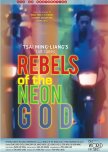
Esta resenha pode conter spoilers
Character driven with a melancholy atmosphere
Step back to a place in time with video arcades, skating rinks, phone booths, pagers, and no cell phones. Teens have been rebelling since the dawn of time and these teens were trapped in the cement jungle of Taipei with only the detached neon god spreading harsh artificial light over the packed, dreary streets. Welcome to the Rebels of the Neon God.The film follows the lives primarily of Hsiao and Ah Tze. Hsiao is a teenager failing at his college cram school and completely disinterested in studying. He lives with his parents in a small, but comfortable apartment. His mom is convinced that he is the reincarnation of the god Nezha, explaining the emotional distance between father and son. Tze is a petty crook who with his buddy, Ping, steals change from phone booths and vending machines to use at the arcade. Hsiao's father is a taxi driver whose side-view mirror is broken when Tze smashes it in an act of rebellious aggression, an act that will come back to haunt him in more than one way.
Tze lives with his brother in a filthy apartment with a backed-up kitchen drain that constantly floods the place. He sleeps on a cot above the moat, flicking cigarette butts into the swill. He begins a relationship with Kuei, his older brother's one night stand. She works in a skating rink and for the phone "dating" service but is as aimless as Tze and Ping. When Hsiao withdraws from the college prep class and pockets the money, fate brings him across the path of Tze. He stalks Tze with the adeptness of a serial killer, watching as he and Ping steal the motherboards from the arcade's games. Hsiao's father locks him out of the house for taking the refund money and disappearing. With nowhere else to go, Hsiao returns to the hotel to rent a room where Tze and Kuei are spending the night. Obscured by the falling rain he takes the opportunity to have a little revenge for the road rage incident by vandalizing Tze's motorbike and spray painting that Nezha was there next to it. For nearly the entire movie Hsiao is emotionless and speaks no more than 10 words, but when he sees Tze's frustration over his destroyed bike he literally dances with joy. When the mother board deal goes south, the petty crooks end up escaping in the cab with Hsiao's dad which triggers reactions in both Tze and the father with feelings of guilt for both men.
None of the youth had anything to look forward to and sought to find pleasure in the moment, whether it was games, smoking, sex, or impaling a cockroach on a desk. Hsiao was an isolated boy with anger seething below his benign face, unable to measure up to what his parents wanted from him. Whether he went home again or remained on the streets was never answered, although his father left the door cracked open for him. Hsiao's parents worshipped the old gods, he and the others answered to the cold god of the streets. Tze was always restless whether pulling small jobs, hanging out with his friends, or smoking like an inmate marking time in his apartment. Ping and Kuei were largely side characters, the loyal buddy and the girl Tze had sex with, but struggled to commit to. Despite their gritty exteriors, Tze and Ping weren't hardened criminals, they simply had nowhere to go and no better tomorrow to look forward to.
The area of Taipei where the movie was filmed came across as dirty and deteriorating though there were signs of new construction. Rain fell almost constantly, making the urban setting more claustrophobic. Aside from Tze's dilapidated apartment, two seedy hotels were used as sets, complete with porn on the small televisions. The streets, school room, and arcades were packed with people, people who were side by side but not communicating. Phone "dating" was shown several times, so even the normal act of meeting someone was difficult to do.
These young people were alienated from the general society, living somewhere on the edge without a safety net below them, desperately searching for belonging. Despite the oppressive atmosphere, there was a glimmer of hope. Each person who watches the film will likely come away with a different interpretation based on age and walk of life. I saw young people who felt trapped, rebelling against the suffocating box they'd been put into. They were all longing for love and acceptance and something that would help propel them to a brighter future but with no idea how to get there.
8/9/23
Esta resenha foi útil para você?
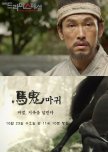
Drama Special Season 4: The Devil Rider
4 pessoas acharam esta resenha útil
Esta resenha pode conter spoilers
Don't forget to tip your rider!
The Devil Rider packed a big emotional punch into a short amount of time. Instead of single-mindedly focusing on the royal court and their politics, this drama special focused more on The Devil Rider and the people hurt and forgotten by an overly entitled elite.In 1637 Choi Munbok was assigned the task of delivering a message to a Joseon general during the conflict with the Qing dynasty. Serving his country meant leaving his wife who was in labor. He rode his horse through a harrowing hail of arrows during multiple ambushes, suffered an injury that would be lifelong, all to deliver a message that ended up being meaningless. Fourteen years later he became unwillingly embroiled in palace politics which put his daughter's life at risk. He would once again be asked to become The Devil Rider.
Yoo Oh Sung gave a wonderfully emotional performance as the imperfect Choi Munbok, portraying a broken man who often let his daughter down yet was also fiercely protective. He showed a man dragged down by guilt and a loyalty he could not forsake. All of the supporting cast were strong. Lee Chae Young gave an excellent performance as the daughter of the betrayed general looking for vengeance.
The Devil Rider could be frustrating and heartbreaking telling the story of people who were used and discarded by the imperial court. "Rags like us never had names to begin with." Still, Munbok was able to free himself from his past and grasp what was important to him with a lighter heart in the present which is all most people can hope to do even today.
8/8/23
Esta resenha foi útil para você?
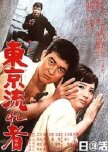
Esta resenha pode conter spoilers
"I'm a drifter, the man from Tokyo"
If you want a good example of a highly stylized film, Tokyo Drifter fits the bill. With its vibrant Crayon coloring, stagey architecture, and jazzy theme song sung and whistled by various characters throughout the film, it's more of a hypnotic experience than yakuza story.When Tetsu and his boss Kurata attempt to go straight, the Otsuka gang works to bring them down by ruining a real estate deal Kurata is orchestrating. Three murders later, Tetsu is forced to go on the run or drift until the heat is off. Otsuka's hitman "The Viper" is always close on his tail. Tetsu evades him across Japan with the help of "Shootin' Star," another drifter who warns him that Kurata may betray him. One character observes, "It's hard to handle a man like that once he gets good and mad." Director Suzuki rewarded the audience with Tetsu finally becoming the hurricane he was renowned for being. The film ends predictably in Tokyo for predictable reasons, but the trip there made the ride worthwhile.
Suzuki edited the film in such a way that there were times I wasn't sure what happened. He could make it challenging to keep up, especially in the snowy battles in northern Japan or during a dreamlike fight on a snowy train track. You never knew what to expect, there was even a bar room brawl, of course in a Western bar because no one brawls like Brits and Americans. Though the film supplied plenty of fist fights, gun fights, even sword fights, none of the fights were particularly convincing. The final scene was orchestrated like models doing a shoot, color coordinated with the set's architectural pieces. The gun fight more a dance than a struggle for survival.
Aside from the use of vibrant colors, the lighting could be surreal and contrary to the rules of nature. The sets may have been stylish but also appeared flimsy, especially when someone bumped into a wall causing it to shake. There were gorgeous travelogue shots of Japan as Tetsu drifted through them. But it always came back to the bright neon lights of the seedy side of Tokyo. The film felt quintessentially 1960's in manic mood and color.
While the film could bounce around-the betrayals, alliances, and creative storytelling never let the momentum slow down. Tokyo Drifter is a surreal yakuza experience, but one that is worthwhile if you like arthouse films or those films a little on the vividly strange side.
8/8/23
Esta resenha foi útil para você?

Esta resenha pode conter spoilers
Learning to let the music pour out of you
Tale of a Raindrop is a coming of age story about Michiru, a young woman who is on the cusp of graduating from college, and who must confront ghosts from the past and challenges from the present in order to let the music within her pour out.The movie opens with Michiru stating like a mantra:
"A lot has happened in the past few days. My best friend passed away. A man told me he loves me. I met my sister that I had never met before, and she is gone. And now I'm standing by a snowing beach. I came here to meet my father. I'm going to graduate college next month, and I will start working for a broadcast company. This is the story of my youth."
Chapter 1: Like Music Pouring Out from the World
Michiru was raised by a single mother, never knowing her father. One day she received a letter from an unknown younger sister. Sayuri had also been abandoned by him. She told of things their father liked, especially a book titled "Snowflake". It was a story of a snowflake who fell in love with a raindrop, but when it begat another raindrop the snowflake dissipated. At the theater where she worked a strange young man who loved silent movies mumbled nervously that he loved her. The mumbler took her to a concert in the park which entailed a friend who played the violin. Michiru watched in amazement as the mumbler and violinist danced to the music in their own joyful world.
Chapter 2: Like Music Pouring Out of Her
Michiru finally met up with her sister Sayuri, a high schooler who had turned to prostitution to earn money for herself and to support her older boyfriend's drug habit. The two sisters lived together, seemingly happy for a while, but Sayuri was bitterly disappointed to find that despite sharing an absentee father, Michiru wasn't miserable and hadn't been forced to live as harsh a life as she had. Before she left, Sayuri gave Michiru a letter from their father's old friend. Though Sayuri rejected her older sister, a special gift set her free to dance to her own music.
In anticipation that he would lead to her father, Michiru tracked down the old friend who turned out to be her age. Through him she discovered the lonely and sad life her father had lived. Afterward, as she walked along the snowy beach we returned to where the movie began with her stating her mantra over and over. The music grew louder as Michiru made peace with the past-the losses, the grief, guilt, anger, pain, and betrayals and found the music within. She realized who she was and that person was not reliant on who her father had been. As she began her new life, like the blooming cherry blossoms, she emerged from her dormancy, forgiving and refusing to carry the baggage of the past.
Chapter 3: Like Music Pouring Out from Me
"The world silently crawled inside me. I cannot stay here any longer…I will never stop dancing under the rainbow."
Tale of a Raindrop was an almost whimsical look at a young woman beginning new chapters of discovery in her life and coming to terms with losses along the way. Through her relationships, she learned how people were able to find the music in themselves in order to dance joyfully. There were times it fell into overly precious territory, almost pretentiousness, but then righted itself, as Michiru confronted the past and present. Rainbows cannot form without raindrops, and Michiru found her place in the world as a beautiful raindrop.
8/7/23
Esta resenha foi útil para você?
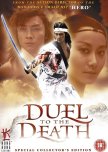
Esta resenha pode conter spoilers
Shaolin vs Ninja!
Duel to the Death was short on plot but delivered with high flying action! Two men met to fight for personal and national honor and pride. More than that it had ninjas-exploding ninjas, invisible ninjas, even naked ninjas. Tony Ching Siu Tung pulled out all the stops for the fight choreography.Ching Wan leaves the Shaolin temple to participate in a fabled duel. Hashimoto, his opponent, is sent by the Shogun to defeat him in order to honor the country. Kenji, unknown to Hashimoto, is also ordered to go to China with numerous ninjas to "help" Hashimoto win and steal kung fu secrets from the temple. Song Lam, a cross-dressing swordswoman, crosses paths with both of them before revealing that she belongs to the school where the underground arena holds the fights. Surprisingly, both male leads were not fooled by her disguise! The ninjas also kidnap China's greatest fighters to take back to Japan to force them to disclose their kung fu secrets.
The plot and the acting were simple. Where this movie excelled was in the fight choreography and ninja action. The film was quite dark with numerous gruesome deaths and dismemberments. What made this one a winner for me were the ninjas, many of their scenes were hilarious, though I don't think they were intended to be. A giant ninja divided into five ninjas-even a naked one, they hid in the sand, concealed themselves on ceilings and in trees, disappeared, and literally exploded. My favorite scene had ninja kites! When Eddy Ko's character met his demise, I laughed hysterically. The sword action was fast and aided by serious kung fu and ninja flight. I don't think I've ever seen as much wire-fu and prolonged aerial action in an older martial arts movie, especially one that wasn’t a fantasy.
Norman Chu played a mostly respectable samurai who was taught to win at all costs. His was the strongest performance of the lot. Damian Lau as the more thoughtful Shaolin fighter, was sadly lacking in screen charisma. I almost didn't recognize Eddie Ko behind his thick black beard. Speaking of beards, the wigs and beards were among some of the worst I've ever seen---comically bad. The costumes and sets, on the other hand, were quite lovely. A couple of telephone poles and more modern roads weren't camouflaged very well though it did look like they tried with leaves and sand. Overall, the cinematography, scenery, and music were of a higher quality than what you would expect from this era and genre.
Duel to the Death raced along at a fast pace. Whenever there was a quiet moment, a ninja was sure to pop out of the sand or even thin air to liven the place up. For fans of old kung fu movies, this is definitely one to seek out. Whether you watch it in all earnestness or like me, as laugh therapy, you're sure to find at least parts of it entertaining. It's worth it for the ninja kites alone.
8/5/23
Esta resenha foi útil para você?

Esta resenha pode conter spoilers
Lots of noise, little substance
Hidden Strike starring Jackie Chan and John Cena finished filming in 2018 and finally made it to Netflix five years later. The film felt like it could have been on-hold since 2000 with its over-reliance on CGI, gravity defying stunts, and sexist humor.Dragon Luo and his security team are called to Iraq to help evacuate Chinese workers from their refinery who have been attacked by mercenaries. They load up special buses to transport the workers and their families to the Green Zone. On one of the buses is Luo's estranged daughter Mei. Chris Van Horne who used to work in private security, now resides in a village in Iraq and helps out with the local orphans. His brother Henry talks him into attacking the convoy with the story that it contains the rebel criminals responsible for their father's death. It doesn't take long for Luo and Chris to meet up, compare notes, and join forces to stop the bad guys and save the hostages.
I watch a lot of martial arts and action movies, and can appreciate a check your brain at the door movie, but was disappointed in the fight choreography for this film. Jackie's character relied on kung fu as was to be expected for many of his fights while Cena appeared super human with his strength. At the age of 69 Chan still moved pretty well. Many of the fights, especially with Cena, came across as completely unbelievable due to wire work and CGI. Jackie had one silly fight in fire suppressant that was entertaining but went on for too long. Several of the fights using both weapons and fists and kicks seemed uninspired. If you approach it as a comedy or even a cartoon with a high body count, there were humorous moments. A couple of scenes with a jet engine and one involving a cliff almost strayed into Wiley Coyote territory.
The problem with some of the comedy was that it relied heavily on hand signal jokes and flat tire jokes. Oh, and women don't know how to drive humor. The hand signal schtick was confusing because Chris' dad died due to a miscommunication, which was supposed to be the source of his man pain. The producers must have felt an action and comedy movie wasn't enough, because they threw in an ill-conceived romance. They didn't have time to effectively build the buddy/bromance aspect of the film, but still tried to wedge a possible "romance" which fell flat largely due to crude comments by Chris. Even the relationship between the two brothers was insufficiently developed, which lowered the emotional stakes when tragedy hit. It might have been a mindless action film, but buddy and romance chemistry is even more important in such cases. And while Chris' love for the villagers was supposed to show what a great guy he was, it felt a little condescending. Somehow the Iraqis were only colorful extras in the background instead of having any involvement in the goings on in their own country.
If you are a Jackie Chan and/or John Cena fan, need a movie with lots of explosions, gun fire, quippy comments, CGI, and wire-work, this may be one you need to check out. If you're hoping for something more than a few entertaining moments, best to lower your expectations or see what else is on Netflix. This was a strike out for me.
7/28/23
Esta resenha foi útil para você?

Esta resenha pode conter spoilers
"War is hell"
Children of Hiroshima was made seven years after the bombing of Hiroshima, when the wounds were still fresh and the horror still a recent memory. The film showed a scarred city rebuilding, but rubble, blown-out buildings and stripped trees were a visible reminder of the terror that took place on August 6, 1945 at 8:15 a.m. Into this setting four years after the blast, Takako, a kindergarten teacher, visits her family's grave and seeks out the three surviving students from her old class.Takako escorts the audience on a tour of Hiroshima and her reunions give us a glimpse into the different ways people suffered after surviving the blast. She looks up the only three children still alive from her class four years ago. One child shines shoes to help his family, his mother works on a building while his father lies dying from radiation poisoning. A little girl saved by a priest during the bombing, lives in the church but has fallen ill with radiation poisoning. The last child is likely the luckiest. His parents were killed but he still has two older brothers and an older sister. After five years of waiting, the sister whose leg was badly damaged when she had been trapped under rubble is about to be married. Takako's teaching friend is sterile, yet opens her heart and helps other women have babies. And an old family friend, blinded and deeply scarred is reduced to begging on the street and resides in a shack outside of town. His grandson lives in an orphanage, one among many such children.
The story could feel manipulative at times, especially when Takako intruded into private family moments as if only through her eyes could the audience witness the other's misery. While I loved Ifukube Akira's Godzilla scores, his music here was heavy handed as if attempting to elicit an emotional response and felt out of place. I recognized his ponderous marches immediately.
The anti-war theme while important and still timely was bluntly reinforced with each succeeding encounter.
Director Shindo judiciously left out the debates over why the war was started, how many innocents suffered under the Japanese war hammer, and whether the bomb(s) should have even been dropped. I will follow his lead in those matters. But undeniably by showing the cost to people's lives, and the long road to healing, he did give ample examples of why "war is hell" and "the greatest evil". Perhaps not for the Japanese, but for people around the world, this film may have been the first time they'd seen the damage done in Hiroshima not only to the city but to the people. Both Shindo and actress Otowa Nobuko were from Hiroshima, making this film more personal for themselves. As he did with some of the people Takako came across, he also revealed hope for the future, a resilient and generous people, and life beginning anew out of the ruins.
In 1952, the occupation of Japan had just ended and the people were still reeling and learning how to cope and heal from a national tragedy along with post-war self-reflections. A variety of emotions played out in Children of Hiroshima-grief, resentment, hope, love, fear, and anger. When Takako heard a single plane flying above, the memory of the fateful day was triggered, a day with all the normal things people do under a clear blue sky, until a new horror was unleashed upon them. War is hell and the greatest cost is always for the innocents who pay the price.
7/27/23
Esta resenha foi útil para você?

Esta resenha pode conter spoilers
The title is the best thing about this movie
When a sci-fi movie opens quoting Charles Dickens, you might think you're in for an intellectual thriller about gene manipulation. Intelligent writing is something this movie will never be accused of. Bearing the title Mutant Ghost Wargirl, you might also think you are in for some wacky fun or a thriller about a deadly phantom. Disappointingly the movie wasn't much fun or thrilling .I'd like to blame the terrible subtitles as the reason I struggled to understand the story, but bad as they were, poor translations weren't the major problem. Ghost aka Wu Qing Qing is an agent for The International Security Union who goes undercover in The Korean Mystery Crime Organization in order to bring down an illegal gene experimentation lab called Medusa. She ends up being dosed with a gene injection fluid (GIF). An extraction team arrives to break her out, but the bad guys have a demigorgon which slows them down long enough for a bad mutant to kill most of the team and kidnap Ghost's friend. Mysteriously and off-screen, Qing Qing is rescued by a Chinese investigator named Zhou Yang in Korea. For cliched plot reasons, Qing Qing has developed amnesia. She also has super powers due to the GIF and every time the fluid activates further, an increased percentage appears on her arm to reflect the new abilities. Slowly her memories return prompting Qing Qing and Zhou Yang to seek a way to get the secret microchip she stole from the baddies back to her people. Lots of fights ensue with her powers further increasing.
I was quite confused when the movie indicated it was set in 2077 Korea because where Qing Qing woke up the signs were in Chinese and the street décor was decidedly Chinese. With the exception of a couple of "Korean" police officers and a few people in a strange nightclub with its own green haired Joker, everyone spoke Chinese. Later they mentioned it was Chinatown, but with Chinese agents operating in Korea and a giant holographic dragon circling about downtown Incheon it looked more like China had annexed the country. The Joseon styled robots in hanboks who served the Chinese Big Bad were troubling.
The story and editing were choppy with terrible pacing. Story logic must not have been a priority because there were huge lapses in narrative and logic. A romance was shoe-horned in, developing quicker than Ghost's super speed given the whole story took place over a day or two. The sets and lighting looked straight out of Blade Runner without the charm. Most of the acting was sub-par, with the villains being extra cringe worthy. Qing Qing's dominant power was the ability to teleport like Marvel's Nightcrawler into a puff of black smoke, followed only by her ability to spit up gallons of blood. Out of all the Chinese movies and dramas I've watched this movie wins the Buckets O' Blood Award for the most red goo expectorated. Many of the fight scenes relied on Matrix styled slow-mo action with kung fu posing. Or the fights were almost non-existent as Qing Qing and her black smoke moved so quickly you only saw the bodies falling. As often as weapons flew directly toward the camera I wondered if it was originally filmed for 3-D. Wasn't there anything good about this movie you may be asking? The CGI wasn't bad during several fights, but that's all I've got.
The writers for Mutant Ghost Wargirl could have given the movie more meaning by delving deeper into the ethical issues of gene manipulation. Even without confronting the morality of using people as guinea pigs, the messy story could have been cleaned up some if they had better explained key plot points and not make the viewer fill in the enormous narrative gaps like a road crew filling in potholes after an ice storm. What the movie really needed was for a scientist to have developed a Better Acting Injection Fluid and a Make the Story Coherent Injection Fluid, because as it stands the ridiculous title was the most fun thing about the whole movie.
7/15/23
Esta resenha foi útil para você?
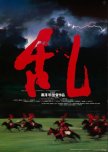
Esta resenha pode conter spoilers
"In a mad world, only the mad are sane"
One of the meanings for Ran in Japanese is "chaos". You know when you are about to watch a film by Kurosawa based on Shakespeare's "King Lear" you are going to experience a theatrical marvel, chaos, and a boat load of pain. Kurosawa used all of his skills to bring to life the story of a king driven mad by his traitorous children. At 75, his directorial skills were far from obsolete. He made a stunningly beautiful and heartbreaking tragic epic in a manner only he could do.Hidetora who had unified his region through fire and the sword and an utter lack of mercy announces that he is ready to retire. Taro, his eldest son, flatters him feigning humility when Hidetora bequeaths the title to him. He gives the two other sons, Jiro and Saburo their own castles, confident that his actions will bring lasting peace to the valley. Far from a sycophantic speech to his father, Saburo, the only son who loves him, tells him the plan will never work as does the court jester. Saburo and Hidetora's loyal retainer, Tango, are both banished for speaking the truth. It doesn't take long for Hidetora to realize his youngest son was right. Taro, at the bequest of his wife, Lady Kaede, humiliates his father by forcing him to sign a pledge of loyalty and into handing over the title Hidetora had sought to retain. Hidetora travels to Jiro's castle but finds no welcome from his middle son. Upon hearing the third castle is empty he and his entourage seek shelter there only to fall into a trap. Taro and Jiro join hands to destroy their father. After every last man and woman loyal to Hidetora is killed trying to protect their lord, Taro is "accidentally" killed, and his father is allowed to walk out of the burning keep, his mind completely broken. For all of the victories in his life, he could not see the evil his sons had harbored in their hearts and that evil would bring all he'd fought for and attained to naught.
***Warning! 417 year old spoiler ahead in the next paragraph!!!***
As Hidetora wanders aimlessly, his jester and Tango find him and care for him. Lady Kaede seduces Jiro and orders him to have his gentle wife, Sue, murdered. When Saburo comes to find his father, Lady Kaede incites Jiro to attack Saburo's men after agreeing to a truce. Saburo finds his disturbed father in a rocky "grave". Saburo's forgiveness clears Hidetora's mind and they dream of telling tales and living together. Jiro's man kills Saburo and Hidetora loses all hope and dies next to him. Like in King Lear, the family was extinguished. Saburo's men and allies triumphantly kill Jiro and his men laying waste to the last of Hidetora's family.
Much like King Lear, Ran ended with the tragic and inevitable loss of life based on a father's bloody past, pride, and blindness to the truth. Hidetora was haunted by all those he'd killed, including the families of his daughters-in-law. Unable to escape the ghosts of his cruel actions, Hidetora and his jester were forced to take refuge among the rubble of the keep he'd burned, at one time spending the night in the hut of a man he'd blinded. His jester ever speaking the truth and folly of his actions. There were no heroes in this film. Hidetora had blood on his hands. Jiro and Taro were murderous and duplicitous. Although Lady Kaede was widely hated, her vengeful actions, with the exception of her hatred of the Lady Sue, were understandable. Only Saburo who spoke the truth perhaps had a vision for a better tomorrow and he ended up paying for his father's sins.
At times, Kurosawa showed the chaos of battle in a beautiful manner with soldiers racing across fields and in castle keeps, silently except for the haunting music. Just as quickly the exquisitely orchestrated military dances devolved into the brutality of war with bodies filled with arrows, severed limbs, and crimson blood dripping ceilings. Fire and smoke choked out all sanity and peace. At one point, Hidetora wondered if he was in hell. He was in hell, a hell of his own making carved out by the carnage he had wrought during his life, the example his sons had learned from, pitting them against him and each other.
The opening scenery was gorgeous, vibrantly alive with verdant green hills. Kurosawa was truly a master of filling the screen with interesting movement and use of color. After the dye was set and the father gave his sons their inheritance, the windblown landscapes became dry and vast. As always, Kurosawa's fateful wind blew across the screen, tinged with either dust or smoke. Emi Wada won an Oscar for best costume design and it showed. The lifeless beige and gray backgrounds were the perfect contrast for her intricately and brilliantly hued costumes. The only detractor in this film for me was Nakadai's makeup. Much like the aging makeup on Mifune Toshiro in "I Want to Live", it was overly theatrical. The white and purple makeup obscured Nakadai's face and thus his unhinged performance.
Whether order was restored out of the familial chaos, is unknown. The film showed that confusion and disorder are always at the ready when truth is abandoned for what people pridefully want to hear. Children learn from what their parents do, not what they say, especially when their parent has been burning villages and castles to the ground in his desire to gain more. Hidetora made the classic mistake of thinking upon his retirement he had any say over what the next generation would do. Their desire for power was just as ravenous as his own had been-maybe more.
The message is timeless, whether in Shakespeare's day, Kurosawa's, or our own. As long as chaos bids us take what is not ours, view others as less than and disposable, we are bound to repeat the actions that bring sorrow instead of joy. The last character standing, blind atop a precipice, his painting of the Amida Buddha fallen and out of reach, reflected much of the mood of the film. The lust for power blinds men, their only hope for peace lost, ultimately leaving everything in ruins.
"It is the gods who weep. They see us killing each other over and over since time began…They can't save us from ourselves."
Ran was a gorgeous and enthralling film to watch and a cautionary tale as well.
6/28/23
Esta resenha foi útil para você?
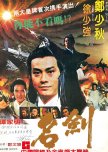
Esta resenha pode conter spoilers
What price honor and glory?
The Sword asks the question, "what price honor and glory?" It's something I always wonder when I watch these films where swordsmen try to move up the pecking order by defeating someone ranked higher than themselves and toss the word honor around while doing it. "Excuse me, I know we don't have any disagreements, but would you mind terribly battling me to the death to see which of us is the superior swordsman?" This procedure never seemed very polite, much less honorable. In this film, Adam Cheng was forced to weigh the costs of spending years hunting for a legendary swordsman simply to test his skills.Adam Cheng as Li Mak Yin befriends Ying Chih, a young swordswoman being hunted by a kidnapper, on the road to finding Hua/Wah, the legendary swordsman who has gone into hiding. Along the way he runs into his old flame who grew tired of waiting while he was on his quest and married Lin Wan (Norman Chu). Lin Wan turns out to be a vicious brute who wants Hua's sword Hon Sing. When Ying Chih is finally kidnapped Li goes to help her and is gifted the cursed sword Chi Mud to aid him by a woman who saved his life after a fierce battle with Lin's henchman. Turns out Ying Chih is Hua's daughter. In a very awkward moment after returning the man's daughter, Li asks if they could duel. After that interlude, the bodies start stacking up.
For a 1980 martial arts film, The Sword was slow, melancholic, and artfully done. Director Patrick Tam used beautiful framing and compositions combined with dramatic lighting. 1980's synth music was utilized for the soundtrack which actually worked quite well for setting the mood. The film asked how it felt to get what you wanted. Were the costs in innocent lives worth a lifetime of trying to beat and be the best? For the lone swordsman was the emptiness and loneliness of the lifestyle a satisfying tradeoff to feed one's pride and ambition?
The stunt work and fight choreography were acrobatic and quick. Despite being a more thoughtful movie, it did have gruesome ends to some of the fights. There were not only the traditional impalements, but one person decapitated himself and another was split in half. Chi Mud, much like The Ring of Power, was infused with hate and malice, and considered an evil sword. And just like the ring, it orchestrated the deadly destiny of several lives.
Adam Cheng played the conflicted and ambitious swordsman well. As Li weighed some of his exploitive actions, his life goals began to change. Norman Chu can be counted on to give depth to a villainous character and he did. Tien Feng, often cast as a baddie, was sympathetic as the aging considerate swordsman who cared for those around him. Jade Hsu found just the right balance as the firebrand daughter. She was forced to act idiotic for a scene but the writers finally put Ying Chih back on the right path. Eddy Ko, in a mostly silent role, made for a frightening henchman. Overall, the acting was quite good, especially for the genre.
The Sword was an excellent martial arts film for 1980 in comparison to so many others made during this time. The scenery, settings, and costumes were of a higher quality than most. For those looking for non-stop action, this might be a disappointment because it takes its time developing Li's character arc and the stakes being played for. The movie ends on a mournful note as Li moves beyond what he has been taught about honor and begins to understand that the real world has real consequences for his prideful actions. I would definitely recommend this film for fans of the genre. As always, I rate pre-1990 niche dramas on a curve.
6/27/23
*Many sites use a copy and pasted synopsis that says a swordsman and a samurai team up to find a blade. There is no samurai in this film, my guess is that it's either for a different movie or someone wrote a synopsis who had never seen this film.
Esta resenha foi útil para você?

 55
55 202
202 11
11






















